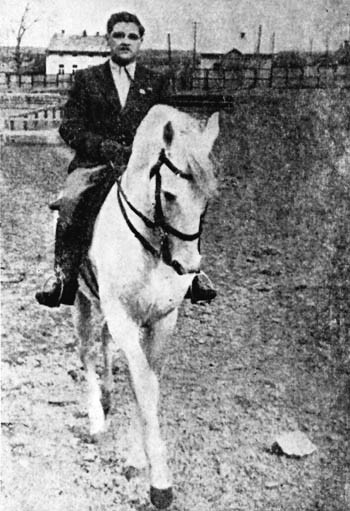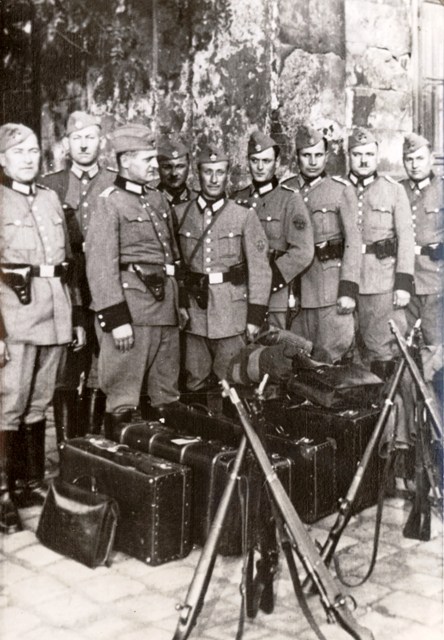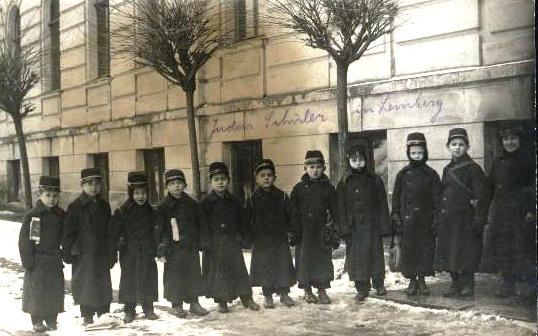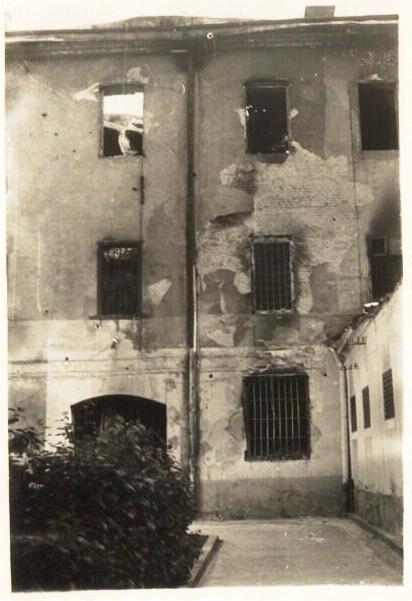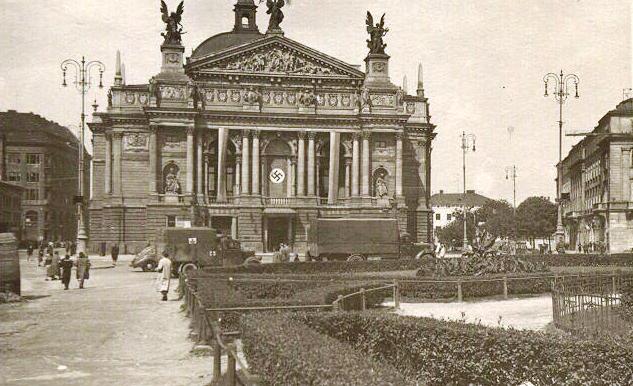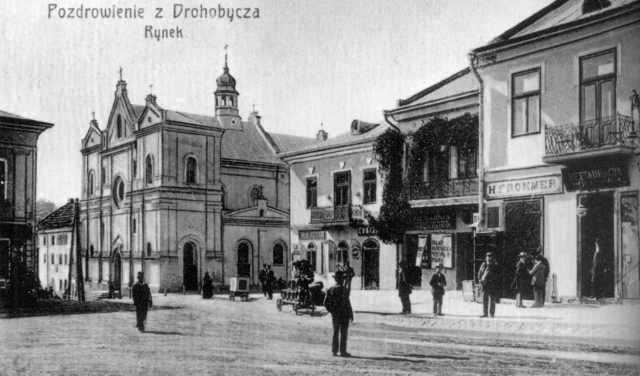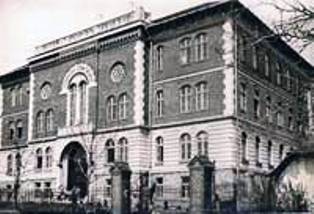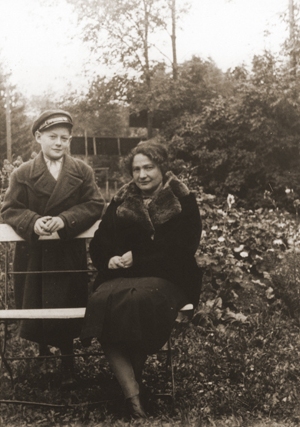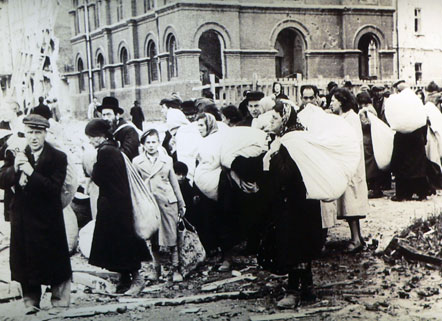Holocaust Education & Archive Research Team |
|
Einsatzgrϋppen
Einsatz Group A Einsatz Group B Einsatz Group C Einsatz Group D Babi Yar Articles Einsatz Leaders Einsatzgruppen Operational Situational Reports [ OSR's #8 - #195 ]
| ||||||
Felix Landau – Einsatzkommando War Diary – Selected Extracts
Part One Service in Lemberg
Lemberg 3 July 1941
On Monday 30 June 1941, after a sleepless night I volunteered for a number of reasons to join an Einsatzkomando (EK). By 9 o’clock I had heard that I had been accepted.
It was not easy for me to leave. Suddenly everything had changed in me. I almost thought that I would not be able to tear myself from a certain person. I felt acutely how attached one can become to another human being. As usual our departure was delayed several times but at 17.00 hours we finally left. We stopped one more time and once again I saw the person who has become so dear to me.
Then we set off again. At 22.30 we finally reached Cracow. The accommodation was good. No creature comforts whatsoever. You can actually become a soldier in just a few hours if you want to.
We then passed through Przemysl. The town was still burning -on the street we saw shot-up German and Russian tanks. It was the first time I had seen two-tier Russian tanks. After a short time we set off again towards Millnicze. It was becoming increasingly clear that the troops had recently been through.
At 21.30 on 1 July 1941 we arrived in Millnicze, we stood around aimlessly without any plan. We quartered ourselves in a Russian military school. It was still burning here too. At 23.00 hours we finally went to bed. I set up my bed and kipped down. Naturally I enquired whether it was possible to send letters but unfortunately it wasn’t.
On 2 July 1941 we were woken at 6.00 as at the front. There were women and children standing by burning houses and rummaging around in the rubble. During the journey we came across more Ukrainian soldiers. As we got closer to the Russians the smell of decaying corpses got stronger and stronger.
At 4.00 pm on 2 July 1941 we arrived in Lemberg. First impression: Warsaw harmless in comparison. Shortly after our arrival the first Jews were shot by us. As usual a few of the new officers became megalomaniacs; they really enter into the role wholeheartedly. We took over another military school in the Bolshevik quarter.
Here the Russians must have been caught in their sleep. We quickly gathered together the bare essentials. At midnight after the Jews had cleaned the building, we went to bed.
3 July 1941. This morning I found out that we can write and it looks as though the post will actually be dispatched. So while listening to wildly sensual music I wrote my first letter to my Trude. While I was writing the letter we were ordered to get ready. EK with steel helmets, carbines, thirty rounds of ammunition.
We have just come back. Five hundred Jews were lined up ready to be shot. Beforehand we paid our respects to the murdered German airmen and Ukrainians. Eight hundred people were murdered here in Lemberg. The scum did not even draw the line at children.
In the children’s home they were nailed to the walls. Some of the occupants of a prison nailed to the wall. Today a rumour went round that we are going to return to Radom. In all honesty I would be happy to see my loved ones again. They mean more to me than I was ever prepared to admit to myself. So far there hasn’t been an execution.
Today we were on alert all day. It should be happening tonight. Things are pretty tense. In this confusion I have only written notes. I have little inclination to shoot defenceless people – even if they are only Jews. I would far rather good honest open combat.
5 July 1941
A small incident demonstrated to me the complete fanaticism of these people. One of the Poles tried to put up some resistance. He tried to snatch the carbine out of the hands of one of the men but did not succeed.
A few seconds later there was a crack of gunfire and it was all over. A few minutes later after a short interrogation a second one was finished off. I was just taking over the watch when a Kommando reported that just a few streets away from us a guard from the Wehrmacht had been discovered shot dead.
One hour later, at 5 in the morning, a further thirty-two Poles, members of the intelligentsia and Resistance, were shot about two hundred metres from our quarters after they had dug their own grave.
One of them simply would not die. The first layer of sand had already been thrown on the first group when a hand emerged from out of the sand, waved and pointed to a place, presumably his heart. A couple more shots rang out, then someone shouted – in fact the Pole himself – “Shoot faster!” What is a human being?
It looks like we’ll be getting our first warm meal today. We’ve all been given 10 RM so that we can buy ourselves a few small necessities. I bought myself a whip costing 2 RM. The stench of corpses is all-pervasive when you pass the burnt-out houses. We pass the time by sleeping. During the afternoon some three hundred more Jews and Poles were finished off.
In the evening we went into town just for an hour. There we saw things that are almost impossible to describe. We drove past a prison. You could already tell from a few streets away that a lot of killing had taken place here.
We wanted to go in and visit it but did not have any gas masks with us, so it was impossible to enter the rooms in the cellar or the cells. Then we set off back to our quarters. At a street corner we saw some Jews covered in sand from head to foot. We looked at one another. We were all thinking the same thing. These Jews must have crawled out of the grave where the executed are buried.
We stopped a Jew who was unsteady on his feet. We were wrong. The Ukrainians had taken some Jews up to the former GPU citadel. These Jews had apparently helped the GPU persecute the Ukrainians and the Germans.
They had rounded up 800 Jews there, who were also supposed to be shot by us tomorrow. They had now released them. We continued going along the road. There were hundreds of Jews walking along the street with blood pouring down their faces, holes in their heads, their hands broken and their eyes hanging out of their sockets.
They were covered in blood. Some of them were carrying others who had collapsed. We went to the Citadel, there we saw things that few people have ever seen. At the entrance of the citadel there were soldiers standing guard. They were holding clubs as thick as a man’s wrist and were lashing out and hitting anyone who crossed their path.
The Jews were pouring out of the entrance. There were rows of Jews lying one on top of the other like pigs whimpering horribly. The Jews kept streaming out of the citadel completely covered in blood. We stopped and tried to see who was in charge of the Kommando. ‘Nobody’
Someone had let the Jews go. They were just being hit out of rage and hatred. Nothing against that – only they should not let the Jews walk about in such a state.
Finally we learned from the soldiers standing there that they had just visited some comrades of theirs, airmen in fact, in hospital here in Lemberg who had been brutally injured. They’d had their fingernails torn out, ears cut off and also their eyes gouged out.
This explained their actions: perfectly understandable. Our work is over for today. Camaraderie is still good for the time being.
6 July 1941
So we are finally moving on to Drohobycz tomorrow morning at 8.00. We’ve been told that the area is partly occupied by the Russians. I am glad we are finally moving on a little.
This morning there was a special announcement that a further 52,000 Russians had capitulated. I should think there’ll be a revolution in Russia in under two weeks. By then Moscow will certainly have fallen. Tonight we are having a social evening with our “Kameraden” from Cracow.
Felix Landau – Einsatzkommando Service in Drohobycz
War Diary – Selected Extracts – Part Two
Drohobycz 7 July 1941
At 16:00 we reached our destination. We were divided into several teams, in order to look for quarters for all the men. We found three houses which had been barely lived in.
Baths everywhere: former Communist Party functionaries’ homes. We were also able to establish that the Ukrainians had done a pretty good job plundering. They had really thought they were the masters for a while.
There’s going to be an almighty clash here- it’s inevitable. Another interesting discovery: although there are very few radio sets here, almost every flat has its own speaker. The speakers can be switched on and off and have an adjustable volume so that means there wont be any need to forbid the men to listen to foreign broadcasts. In this case it won’t be necessary.
I have a strong feeling that we will not be going back to Radom. We have occupied a Jewish hotel for a few days. I was ravenously hungry, so I have just inspected the kitchen and managed to find a little something to eat. The quarters are very basic. The place is teeming with bugs. Now I must close because I have to report for guard duty. I’ll be relieved at 1.00 tomorrow.
9 July 1941
Today there were more surprises. In the morning a letter arrived from the Ortskommandantur. In an unfriendly tone we were informed that our work is to be limited merely to checking papers. In addition the letter declared that we were to ask nothing of the Referent for Jewish Affairs.
As predicted, an impossible relationship. There was a tremendous amount of work. Once again I have got to play general to the Jews. Today I organised a carriage and harness despite the ban.
Today there was beer from the barrel; we could also buy a bottle of Sekt for 1 RM. If only I had post from my Trude. During the day when I am buried in work it is all right but during the night the loneliness and inactivity simply make me despair.
14 July 1941
On 11 July 1941 a vehicle finally left for Radom carrying Dolte, Binder, Gurth and Mireck. Regrettably I could not go with them. At least I was able to give them a letter which I can be sure will arrive. Unfortunately I’ll be other letters as well. Of course as was to have been expected our Kriminal Kommissar immediately took advantage of Dolte’s absence to quench his thirst for action.
Barely an hour later his wonderful orders such as, “Get a move on gentlemen, get that whole pile over here to me” and the like were ringing out. He had arrests and shooting to his heart’s desire. The prisoners, mostly Jews but also some Ukrainians keep on coming.
We work through the night. In the evening a comrade, Urban, and I manage to snatch some time to go and see a cook from whom we can get Mischlanka, sour milk and new potatoes. At 11 in the evening we got back to the base.
A flurry of activity down in the cellar, which I had just cleared up that morning. There were fifty prisoners, two of whom were women. I immediately volunteered to relieve the person who was on guard duty. Almost all of them will be shot tomorrow.
Most of the Jews amongst them were from Vienna. Still dreaming of Vienna. I was on duty until three in the morning the next day. Finally went to bed dog tired at 3.30
12 July 1941
At 6.00 in the morning I was suddenly awoken from a deep sleep. Report for an execution. Fine, so I’ll just play executioner and then gravedigger, why not. Isn’t it strange, you love battle and then have to shoot defenceless people. Twenty –three had to be shot, amongst them the two above-mentioned women. They are unbelievable. They even refused to accept a glass of water from us.
I was detailed as marksman and had to shoot any runaways. We drove one kilometre along the road out of town and then turned right into a wood. There were only six of us at that point and we had to find a suitable spot to shoot and bury them. After a few minutes we found a place.
The death candidates assembled with shovels to dig their own graves. Two of them were weeping. The others certainly have incredible courage. What on earth is running through their minds during these moments? I think that each of them harbours a small hope that somehow he won’t be shot. The death candidates are organised into three shifts as there are not many shovels.
Strange, I am completely unmoved. No pity, nothing. That’s the way it is and then it’s all over. My heart beats just a little faster when involuntarily I recall the feelings and thoughts I had when I was in a similar situation.
On 24 July 1934 in the Bundeskanzleramt when I was confronted with the machine-gun barrels of the Heimwehr. Then there were moments when I came close to weakening. I would not have allowed it to show, no that would have been out of the question with my character. “So young and now it’s all over.”
Those were my thoughts, then I pushed these feelings aside and in their place came a sense of defiance and the realisation that my death would not have been in vain. And here I am today, a survivor standing in front of others in order to shoot them. Slowly the hole gets bigger and bigger, two of them are crying continuously. I keep them digging longer and longer: they don’t think so much when they’re digging.
While they are working they are in fact calmer. Valuables, watches and money, are put into a pile. When all of them have been brought to stand next to one another on a stretch of open ground, the two women are lined up at one end of the grave ready to be shot first.
Two men had already been shot in the bushes by our Kriminal Kommissar, I did not see this as I had to keep my eyes on the others. As the women walked to the grave they were completely composed. They turned round. Six of us had to shoot them.
The job was assigned thus: three at the heart, three at the head. I took the heart. The shots were fired and the brains whizzed through the air. Two in the head is too much. They almost tear it off. Almost all of them fell to the ground without a sound. Only with two of them it didn’t work. They screamed and whimpered for a long time. Revolvers were no use. The two of us who were shooting together had no failures.
The penultimate group had to throw those who had already been shot into the mass grave then line up and fall in themselves. The last two had to place themselves at the front edge of the grave so that they would fall in at just the right spot.
Then a few bodies were rearranged with a pickaxe and after that then we began the grave-digging work. I came back dog tired but the work went on. Everything in the building had to be straightened up. And so it went on without respite.
Sources:
Who’s Who in Nazi Germany by Robert S Wistrich published by Routledge, London and New York 1995. Those Were the Days by Ernst Klee, Willi Dressen, Volker Riess, published by Hamish Hamilton London 1988. Love letters of a Nazi murderer in Lemberg and Drohobycz by Felix Landau 1987. Yad Vashem. Masters of Death: The SS-Einsatzgruppen and the Invention of the Holocaust by Richard Rhodes (Vintage, 2003 reprint ed.) Holocaust Historical Society NARA PRO
Copyright: Victor Smart & Martin Rice H.E.A.R.T 2009
|
